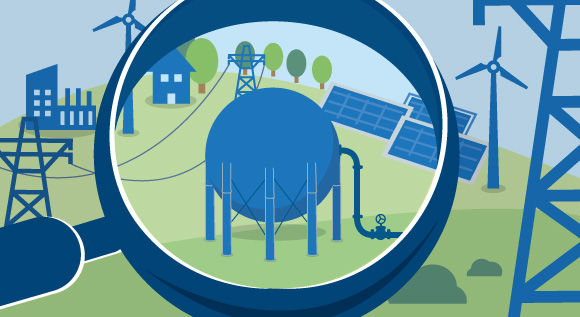What exactly is the Emergency Plan for Gas?
In late March, Federal Minister Robert Habeck announced the early warning level of the Emergency Plan for Gas. As a precautionary measure, the gas supply in Germany will now be closely monitored. Find out what further measures are set out in the emergency plan and what these mean for gas customers.
 © BMWi
© BMWi
This is what it’s all about: an emergency plan based on three stages stipulates what steps must be taken if the security of gas supply in Germany is at risk.
„The gas supply in Germany continues to be ensured,“ Federal Minister Robert Habeck stressed as he announced the early warning level of the Emergency Plan for Gas. And yet, precautionary measures are now being stepped up.
Three stages to guarantee security of supply
Following the announcement of the emergency plan’s early warning level, the Federal Ministry for Economic Affairs and Climate Action will now convene regular meetings of a crisis team in order to ensure the close monitoring of the gas supply in Germany. The team is made up of representatives from government and energy suppliers, including the Federal Ministry for Economic Affairs and Climate Action, the Bundesnetzagentur (Federal Network Agency), the market area manager for gas, the transmission system operators and the Federal Länder. This is the first time that the Emergency Plan for Gas has been activated in Germany. Similarly, other countries including Italy, Latvia, Austria and Croatia have announced the early warning level in recent weeks in order to be prepared for a potential gas crisis.
The reason for the triggering of the early warning level by Germany was Russia’s announcement in late March to only accept roubles for its gas deliveries. However, this would constitute a breach of existing supply contracts. The G7 countries responded by rejecting payment in roubles in a joint declaration issued on 28 March. The aim of the Russian government was to bolster the exchange rate of the rouble as an indirect means of mitigating the impact of the sanctions against the Russian central bank that had been imposed in response to the war against Ukraine.
In order to be prepared for potential restrictions or interruptions to supply, the Economic Affairs and Climate Ministry therefore announced the early warning level under Article 11 of the EU Regulation concerning measures to safeguard the security of gas supply. After all, some 40% of the natural gas consumed in the EU comes from Russia. In Germany, this share had been as high as 55% up until 2021 (click here to find out more). Meanwhile, the volume of the gas imports from Russia has been reduced.
In the early warning level, gas traders and suppliers, long-distance and distribution grid operators are to ensure the security of supply by taking market-based measures such as the use of flexibility on the procurement side, the use of stored gas, the optimisation of load flows among individual gas supply companies, and the calling up of external balancing energy via the wholesale markets. The state, however, will not intervene at this stage. Flexibility in the electricity system is needed to ensure the system’s stability – for example in the light of fluctuations in electricity consumption or generation.
At the alert level (Stage 2 of the emergency plan), the market players remain responsible for action to mitigate the situation. It is only in the event of a „significant disruption of gas supply or other significant deterioration of the gas supply situation“ that Stage 3 of the emergency plan, the emergency level, comes into play. The Federal Government may announce the emergency level by statutory instrument.
The emergency plan provides for a special level of protection to a range of specified „protected consumers“, including households, welfare institutions, hospitals, and gas-fired power stations (which also provide households with heat).
With regard to the impact of the EU sanctions on the business community, the Economic Affairs and Climate Ministry and the Federal Ministry of Finance are working on support measures for companies. A KfW loan programme is to help affected companies secure short-term liquidity by giving them access to low-interest loans exempted from liability. The scheme will comprise a volume of up to €7 billion.
German gas suppliers obliged to refill storage facilities
Should Russia suddenly cut off its energy deliveries, Germany would be able to cope with the absence of Russian gas at least until the autumn. The first energy security progress report, presented on 25 March, outlines a range of measures that can make Germany more independent from Russian energy imports. On 1 May, a second energy security progress report was released, detailing the progress made to date and the current state of play.
Furthermore, the Gas Storage Act has been in force since 30 April, obliging all operators in Germany to gradually fill their storage facilities.
The FAQ list on the Emergency Plan for Gas contains a number of useful tips and links that can help citizens and businesses save energy.
Further information
- Press release by the Federal Ministry for Economic Affairs and Climate Action: Federal Ministry for Economic Affairs and Climate Action announces early warning level of the Emergency Plan for Gas
- FAQ list on the Emergency Plan for Gas (PDF download, 828 KB)
- Emergency Plan for Gas for Germany (PDF download, 667 KB)

